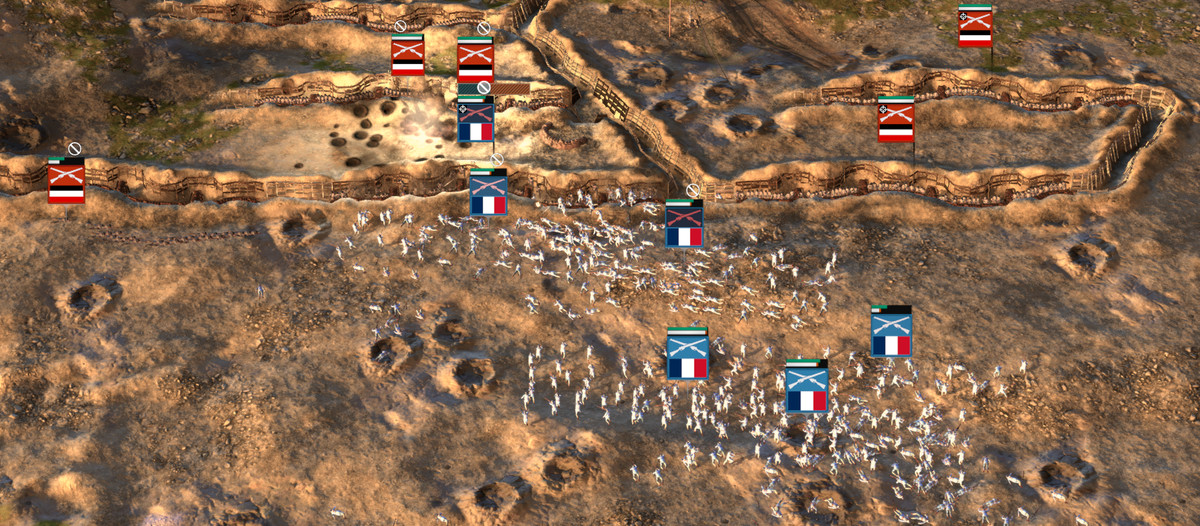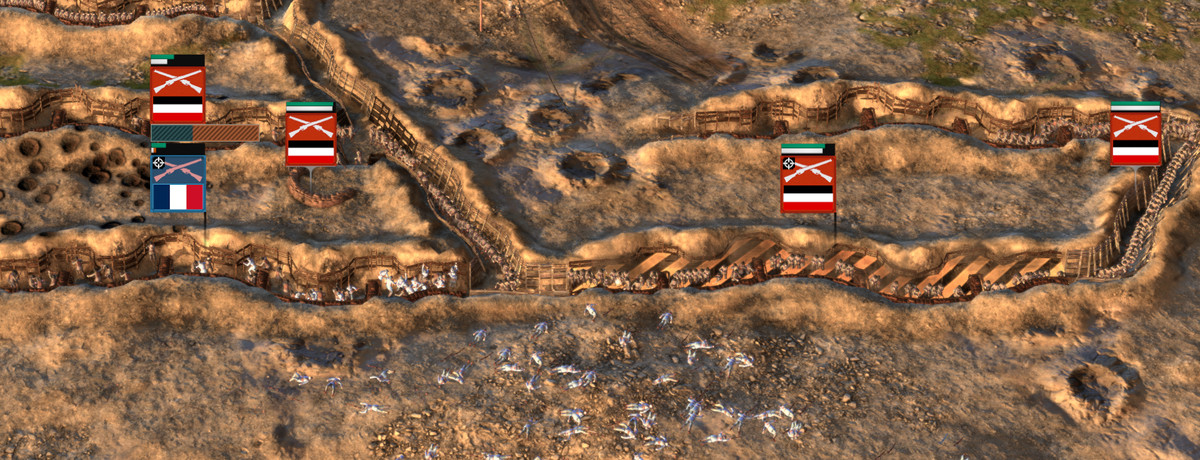So many historical wargames portray conflict and war as something that gets solved by a a small group of individuals. Heroes that, if they fight hard or smart enough, they will eventually turn the tide. The Great War: Western Front, a new real-time strategy game from Petroglyph Studios, quickly discards any notions of gallantry and heroism with a sobering portrayal of the futility of war.
Campaigns in The Great War are split between a turn-based overview of the Western front, and real-time battles that play out when armies clash in each hex. Your goal in the campaign, whether playing as the Central Powers or the Triple Entente, is to either capture the enemy headquarters or completely deplete your enemy’s national will — a numerical representation of losses incurred in battle. In this way, mounting a strong defense that costs the enemy a prohibitive number of losses is a perfectly legitimate strategy.
Commanding a defense in The Great War, however, will force you to forget the habits that RTS games have taught you about keeping the enemy at bay. You might be tempted to create a single-line no man’s land riddled with trenches and machine gun emplacements and supported by artillery, but this paradoxically makes your defense incredibly fragile.
Make no mistake, if there’s a gap or weak point for your enemy to exploit, they will happily make a beeline for your headquarters without a second thought. A smartly layered defense that allows you to quickly adapt to your enemy’s strategy is far more effective. Inevitably, though, you won’t have enough supplies for every weapon or vehicle you want. This is where one of the cold truths of the Western Front sets in: Tanks, planes, and machine guns are expensive, but arming a bunch of men with rifles is cheap.

All too often, I found myself simply plugging a gap in my line with an unconscionable number of soldiers I knew would inevitably perish, but didn’t give it a second thought, because my pride had me convinced that all I needed was a couple hundred more bodies to turn back the enemy’s offensive. This strategy worked on a couple of occasions, but ultimately, it cost me more than simply conceding the battle and saving a few thousand families from reading conciliatory letters from the war department.
With the sour taste of too many pyrrhic victories in my mouth, I vowed not to cower in the trenches any longer, waiting for the enemy to engage me when it suited him. No, I was determined to make a push through the front so powerful that we’d have the boche on the run by Christmas. I mustered a force so massive that it effectively bankrupted my nation, but I had faith that it would be worth it to bring a swift end to the conflict.
I chose my time and place carefully, a rainy stretch of land close to the English Channel that my spies had assured me would be sparsely defended. I set up row upon row of soldiers to surge into the enemy line. They met the expected resistance, and were cut down and demoralized by artillery barrages and machine gun fire. But as the body count rose without my forces capturing a single objective, I fooled myself into thinking that all I needed to win were just two more companies of good men — never mind the fact that we’d already lost 20 others just like them.

As I reflected on my military quagmire, I was reminded of the climactic final scene in 1917, wherein George MacKay presents orders to a callous and scarred Benedict Cumberbatch, who is so certain that he has the enemy on the run that he’s willing to send hundreds of thousands of soldiers to their deaths without a second thought. I then realized: It was me. I was Benedict Cumberbatch. Instead of consolidating my forces and playing smart, my glory-hounding turned me into someone that was willing to throw lives away for a piece of ground that would inevitably be retaken in two months’ time.

The human cost of war isn’t something I typically think about when playing a historical RTS like Company of Heroes, or even some entries in the Total War franchise, in which I’m totally OK with just marching a bunch of dudes into a bad time without giving it a second thought. But The Great War forces you to question whether grabbing that narrow spit of otherwise useless dirt was truly worth what you paid for it.
